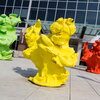
Contact Information
505 S. Goodwin Ave
Urbana, IL 61801
Research Areas
Research Interests
symbiosis and mutualism evolution; evolutionary and ecological genetics of plant-microbe interactions; mobile genetic element and plasmid evolution; evolutionary responses to global change
Research Description
My research focuses on the evolution of mutualisms, which are most generally defined as species interactions that increase the fitness of both (or all) partners. Mutualisms are ubiquitous! And they include some of the most important species interactions in nature (for example: mitochondria, mycorrhizae, gut endosymbionts). Though, at first impression, these friendly interactions might appear tightly coevolved, instead they may be characterized by temporal and spatial heterogeneity, cheating, even evolutionary instability.
I take a multidisciplinary approach and use diverse methods from the fields of quantitative genetics, population genetics, molecular biology, and ecology to understand multiple aspects of mutualism evolution.
Some questions currently motivating my work include:
- Under what conditions (including the abiotic and biotic environment) do mutualisms evolve, remain stable, or break down?
- How phenotypically and genetically variable are mutualistic interactions, and why is such variation maintained, despite selective pressure to cheat or, alternatively, to remain honest?
- Which genes are variable in nature, and which are, or have been, important players in coevolution?
Most generally, I am interested in plants, microbes, and their sundry interactions. Most of my research focuses on the interactions between legumes and their symbiotic nitrogen-fixing bacteria, called rhizobia. This includes the Medicago-Sinorhizobium mutualism because it is a great genetic model with an interesting ecology. I also have interests/projects in: the agronomically-important soybean-Bradyrhizobium interaction, invasive/naturalized clover-rhizobium interactions, invasive/naturalized Medicago lupulina-Sinorhizobium interactions, and the native prairie legume Chamaecrista fasciculata and associated rhizobia.
Education
B.S., 2000, University of Illinois
Ph.D., 2007, University of Minnesota
Postdoctoral Fellow, U. Toronto, 2007-09
Additional Campus Affiliations
Head, Plant Biology
Professor, Plant Biology
Affiliate, Microbiology
Professor, Carl R. Woese Institute for Genomic Biology
External Links
Recent Publications
Gorbitz, D. V., Schwarz, C. P., McMullen, J. G., Cerón-Romero, M., Doyle, R. T., Lau, J. A., Whitaker, R. J., Vanderpool, C. K., & Heath, K. D. (2025). Plasmid transmission dynamics and evolution of partner quality in a natural population of Rhizobium leguminosarum. mBio, 16(12), 1-18. https://doi.org/10.1128/mbio.02497-25
Marquez, I. S., Griesbaum, K., Clark, L. V., Ainsworth, E. A., Christian, N., & Heath, K. D. (2025). Dominant foliar endophytes influence soybean yield and transcriptome. FEMS microbiology ecology, 101(6), Article fiaf053. https://doi.org/10.1093/femsec/fiaf053
Morozumi, C. N., Reitman, A. M., Heath, K. D., Busby, P. E., & Christian, N. (2025). Aboveground-belowground microbial interactions in plants: A call to recognize the complexity within multispecies microbial communities. American journal of botany, 112(9), Article e70100. https://doi.org/10.1002/ajb2.70100
Riaz, M. R., Marquez, I. S., Lindgren, H., Levin, G., Doyle, R., Romero, M. C., Paoli, J. C., Drnevich, J., Fields, C. J., Geddes, B. A., Marshall-Colón, A., & Heath, K. D. (2025). Mobile gene clusters and coexpressed plant–rhizobium pathways drive partner quality variation in symbiosis. Proceedings of the National Academy of Sciences of the United States of America, 122(31), Article e2411831122. https://doi.org/10.1073/pnas.2411831122
del-Canto, A., Sanz-Saez, A., Heath, K. D., Grillo, M. A., Heras, J., & Lacuesta, M. (2024). Conventional management has a greater negative impact on Phaseolus vulgaris L. rhizobia diversity and abundance than water scarcity. Frontiers in Plant Science, 15, Article 1408125. https://doi.org/10.3389/fpls.2024.1408125
